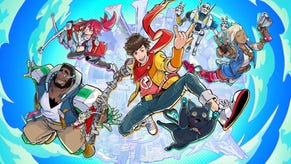Dream On
Stewart Butterfield on defying convention for Tiny Speck's debut game, Glitch
Butterfield points out that paying for progress was a problem in online gaming long before the explosion of social games, but in the last few years it has been taken to a "whole new level." The issue evolved from hand-wringing over gold-farmers and real-money transactions to become an integral part of the way games are designed.
"Once it became apparent that's what was happening we felt even more strongly that we didn't want to have those kinds of monetisation systems. Not just because it seems unsavoury and I think people will burn out on it, but once you go down that road and start designing the game mechanics around that you can't help but design the whole game around that."
"Here's something you can do, it's gonna take three days or you can pay us five bucks, or you can do this totally other thing which is fun, right now, and you're just going to do the thing that's fun and you'll forget about the five bucks. In that case there's no point in having that mechanic."
"I can afford it - that's not the issue - but I think that what Zynga and everyone else have done is kind of a scorched earth policy. People will get burnt out on this; maybe some of them will last for a very long time, but I feel like the easy successes have been taken already, and that won't work in the long run. I mean, I could be wrong about that, and I hope I'm not, because that would be a lame future for games."
"Just my own reaction, the first time I saw that it was okay, the second time I saw that it was okay, and by whatever time it is now I'm like, 'I get this. It's transparent, and I don't give a shit about having a bigger building here that cost me three dollars.'"
So when Tiny Speck says that Glitch is free to play, that's exactly what they mean. At present, the only items you can buy are outfits for your avatar, and beyond that the game is open and unabridged to all. More paid content may be added over time, but that core philosophy of never charging for game advancement will remain. Butterfield claims that he would rather introduce a regular subscription fee than compromise that ideal.
What Zynga and everyone else have done is kind of a scorched earth policy. People will get burnt out on this
However, even though the game is still very young, Butterfield calls the proportion of people paying for content, "very encouraging."
"Certainly, there are some people playing the game who really respect that we're not [charging for progression], and are almost more inclined to support the game because they don't have to. I don't think that will extrapolate out to the 5 millionth player - it's a smaller audience that feels that way."
"What we're selling right now is the ability to customise your avatar, which might sound ridiculous and trivial, but the more you play the game, the more important your in-game identity becomes to you, the more your desire to express who you are in the game world becomes worth five bucks, or three bucks, or whatever."
Tiny Speck recently released developer kits for iOS, Android, Unity and C#, with a long-term aim of allowing players to transfer their Glitch avatars to games and applications on other devices. It's another potential revenue stream, but, as with avatar customisation, the emphasis seems to be on improving the experience rather than making money, based on the assumption that one will naturally lead to the other.
Ultimately, the success of Glitch will be determined by the enthusiasm of its community, and that's very much to Tiny Speck's taste. In the handful of weeks since the game's official launch a dozen new features have been added, hundreds of bugs have been fixed, new code has been deployed to the production servers more than 900 times, and the transition to a free-form economy that allows players to sell self-created items through vendors has started in earnest.
And the real story of Glitch has barely begun. Tiny Speck is striving to provide its players with a sandbox that, like EVE Online, will allow them to author narratives that play out over weeks and months, and radically alter the world. Singing to butterflies and tuning bubbles is the very tip of an iceberg the size and form of which will be decided by the interplay between engaged players and receptive designers.
"We have so much more planned even for the next six weeks that will keep on ratcheting up the richness and the complexity of the world both in economic and ecological senses," Butterfield says. "It feels like it's very close to a threshold where economic and ecological play will just be interesting in itself - even in the absence of larger goals, though those larger goals are coming as well."
"Tomorrow it will be one month since we launched, and what we launched, the 1.0, has a lot of great stuff in it and we're proud of it. But sometimes I just feel like, God, it'll take us another decade to get to where we want to go. There's so much more."







.jpg?width=291&height=164&fit=crop&quality=80&format=jpg&auto=webp)
